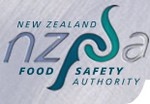How to avoid being hot, cross and sick this Easter
Easter is a traditional time for baking, delicious family meals and special treats. The New Zealand Food Safety Authority (NZFSA) is offering Kiwis simple food safety tips to help you enjoy your Easter holiday.
“Food safety is often forgotten when preparing for a big celebration such as Easter,” says NZFSA microbiologist Roger Cook. “But it's important to use good food handling practices to ensure that a foodborne illness doesn't make you and your guests sick.”
Baking for your friends and family at Easter is a great tradition, so keep it safe. Always wash your hands well before handling food, and do not eat raw bun, cake or biscuit batter that contains uncooked ingredients such as flour. Heating kills many of the bacteria that can make you sick, so cook foods thoroughly.
If you use real hard-boiled eggs instead of foil-wrapped chocolate eggs for Easter egg hunts, and plan to eat them after, make sure they are clean and uncracked so bacteria can’t get in. Use food grade dye for any decoration, and hide eggs in places that are free from dirt and pets. Decorated eggs should be chilled in the fridge until just before the hunt and the total time for hiding and hunting eggs should no be longer than two hours. If you find any eggs the next day, don’t eat them – throw them away.
If you are marinating meat for the Easter meal, do not pour marinade that has had raw meat in it onto cooked meat. Keep all raw meat at the bottom of the fridge and store cooked foods above it so raw juices don’t drip onto cooked food. Avoid cross-contamination by washing chopping boards, benches, plates and utensils that have been used for raw meats with hot, soapy water before using them again for cooked meat or salad ingredients. Cook poultry, mince and sausages all the way through so there are no pink bits - use a meat thermometer to check that meat is cooked, with poultry cooked to 75oC.
Leftovers should be quickly cooled, covered and refrigerated as soon as possible, then eaten within two days of being cooked. Reheated leftovers should be steaming hot.
And if you’re home for the long weekend, make sure the fridge temperature stays between 2-4ºC. You can help control this by avoiding overloading the fridge so air circulates freely, and keeping drinks in a separate fridge so the door is not opened too often.
More information on food safety is on the consumer section of NZFSA’s website www.nzfsa.govt.nz/consumers and the Foodsafe Partnership website www.foodsafe.org.nz
